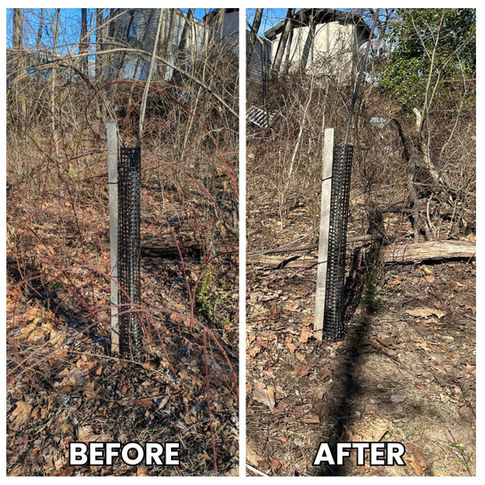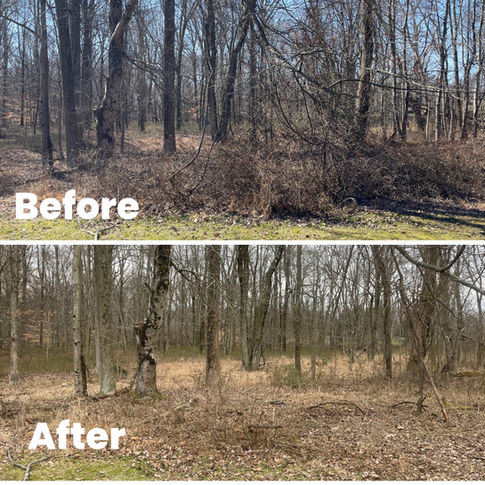THE PROBLEM:
It is very common to see our natural forests degraded and declining fast due to invasive vines, shrubs, and trees. With increased development in suburban areas a lot of woodlands have been wiped out.
However, patches of forest still remain, but are under threat from invasive plants in competition for space, nutrients, and sunlight. This threatens the overall health and biodiversity of our forests and streams, as the homes for many wildlife are endangered in this process.
Example: Kudzu vine has taken over this entire area and killed the trees, shrubs, and ground cover.


THE SOLUTION:
Our approach starts with a forest assessment to determine the health condition of the area. This assessment includes the composition of dominant species in each layer: canopy, understory, shrubs, and herbaceous ground cover.
Our goal is to restore forests and stream areas by removing and controlling the invasive species while saving and protecting our native trees (such as Oaks & Hickories), and planting new species to increase biodiversity.
These actions will improve the health of the forest by increasing light penetration into the forest floor that allows for increased germination and survivorship of native species, eliminating competition for sunlight and providing food and shelter for hundreds of other species. In addition, we will see better air quality and increased carbon sequestration.
Helping the ecosystem will help our communities. Here are some of the common invasive species that are taking over our natural areas:
Tree Invasive Species
-
Tree of Heaven (Ailanthus altissima)
-
Princess Tree (Paulownia tormentosa)
-
White Mulberry (Morus alba)
-
Callery Pear (Pyrus calleryana)
-
Norway Maple (Acer platanoides)
Shrub Invasives Species -
Honey Suckle (Lonicera maackii)
-
Autum Olive (Elaeagnus umbellate)
-
Japanese Barberry (Berberis thunbergii)
-
Winged Burning Bush (Euonymus alatus)
-
Privets (Ligustrum spp)
-
Multiflora Rose (Rosa multiflora)
-
Wineberry (Rubus phoenicolasius)
Vine Invasive Species -
Oriental bittersweet (Celastrus orbiculatus)
-
Porcelain berry (Ampelopsis brevipedunculata)
-
Kudzu (Pueraria montana)
-
Common Periwinkle (Vinca minor)
-
English Ivy (Hedera helix)
-
Japanese Honeysuckle (Lonicera japonica)
-
Winter Creeper (Euonymus fotunei)
























